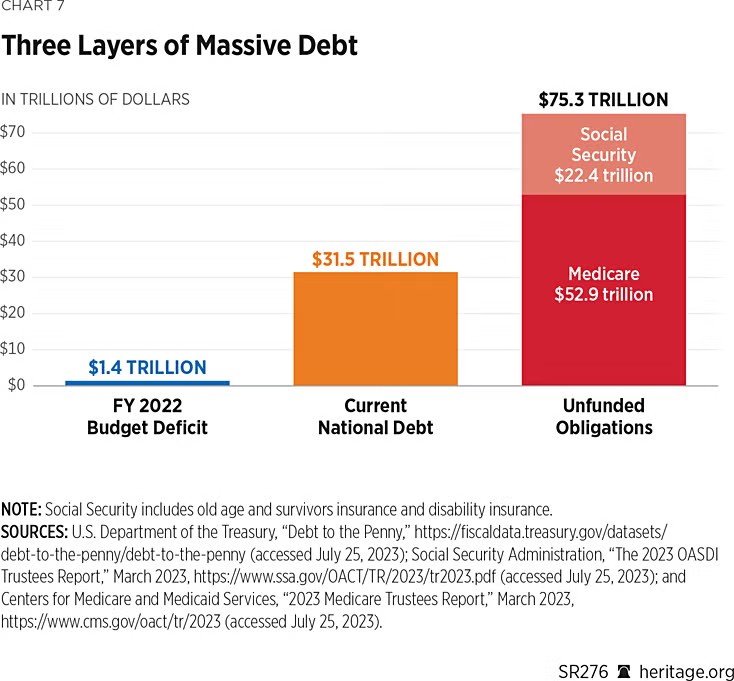Healthcare Wars: The 2023 CMS Expenditure Report, Congressional Budget Blunders, and the Fight for Health Information Transparency

Amidst a cacophony of news about global conflicts, political scandals, drone technology, UFO/UAP phenomena, and other sensational events like J6 and Fani Willis, the critical discourse on healthcare often fades into the background. This article aims to cut through the noise, focusing solely on the healthcare narrative in the U.S., dissecting the financial insights from the 2023 CMS Healthcare Expenditure Report alongside over 60 pivotal healthcare issues currently shaping policy, ethics, and public health. Here, I'll delve into a realm where the battle for transparency, access, and reform is as fierce as any external conflict. - 2024 CMS Fiscal Report
Financial Insights from the CMS Report:
The 2023 CMS Healthcare Expenditure Report revealed an eye-opening total of $4.9 trillion spent on healthcare, averaging about $14,570 per person. This figure not only highlights the vast financial commitment to healthcare but also underscores the intricate dynamics of cost distribution:
- Private Sector Contributions: Businesses contributed $894 billion, an 11% increase from the previous year, with 77% of this coming from employer-sponsored insurance premiums, signaling a shift where financial responsibility leans more on employers.
- Household Expenses: Households collectively shouldered $1.3 trillion, where 38% was for out-of-pocket costs, 27% for Medicare premiums and payroll taxes, and 26% from employer contributions, averaging $3,942 per person.
- Medicare Dynamics: Medicare spending crossed the $1 trillion threshold, with a significant 52% of this now going towards Medicare Advantage plans, up from 39% in 2019, indicating a shift in how care delivery and financing are evolving.
Medicare Analysis:
- Traditional Medicare: This model, based on fee-for-service, often leads to higher government expenditure due to unlimited spending per beneficiary. However, it benefits from lower administrative overhead.
- Medicare Advantage: Through its capitation model, this system incentivizes cost efficiency, potentially lowering government costs by focusing on preventive care and managing chronic conditions.
- Medicare Supplement Plans: These plans mitigate out-of-pocket costs for beneficiaries but are funded through private premiums, not impacting government spending directly.
- Prescription Drug Costs: The report highlighted a stark imbalance where generic drugs, despite being 91.5% of prescriptions, only represent 12.9% of the drug spending, while brand-name drugs, at 8.5%, account for 87.1% of costs. This disparity contributed to an 11.4% increase in drug spending, reaching $450 billion, primarily due to rising costs for treatments of diabetes and obesity.

The Current War on Healthcare Information:
The struggle for clarity in healthcare information is a battlefront where misinformation, especially about vaccines, erodes public trust. Big Pharma's pricing strategies, coupled with their lobbying efforts, further obscure the path to affordable healthcare. Access disparities, ongoing crises like the opioid epidemic, and debates over insurance coverage all highlight the need for transparency. The expansion of telehealth, mental health access, and data privacy concerns are additional fronts where healthcare information must be safeguarded and transparent.
Some Current Healthcare Issues at the Forefront:
- Vaccination Mandates: Balancing public health needs with personal freedoms is a continuous debate.
- Vaccine Misinformation: The spread of false narratives challenges public health initiatives.
- Pharmaceutical Pricing: The role of industry giants in setting drug prices is under scrutiny.
- Healthcare Access: The persistent gap in service availability, especially for marginalized communities.
- Medicare for All: The debate over a single-payer system versus private insurance persists.
- Industry Lobbing: The influence of healthcare sectors on legislation raises questions about policy-making.
- Mental Health: The urgent call for better funding and access to services.
- Telehealth: Its expansion brings both benefits and privacy concerns.
- Children's Vaccination: Declining rates pose risks for public health.
- Vaccine Skepticism: Public figures influencing opinion, complicating health policy.
- Public Health Funding: The impact of budget cuts on community health.
- Opioid Crisis: Seeking accountability from pharmaceutical companies.
- Healthcare Worker Shortages: Burnout and staffing issues threaten service quality.
- Insurance Coverage: Debates on what should be covered, including mental and reproductive health.
- Health Equity: Addressing systemic inequalities in healthcare.
- Bioethics: Ethical distribution of treatments during health emergencies.
- Medicaid Expansion: Political battles over state decisions.
- Research Transparency: Pushing for openness in drug development processes.
- Data Privacy: Protecting patient information in the digital age.
- Reproductive Rights: Post-Roe v. Wade effects on healthcare policy.
- Pandemic Origins: Influencing public health policy and trust, with the ongoing debate whether pandemics are authentic or man-made. This suspicion was heightened when Governor Gavin Newsom from California issued a state of emergency for the "Bird Flu" yesterday, referencing a single confirmed case from Wisconsin, which if true, raises questions about the nature and timing of such declarations. - https://apnews.com/article/bird-flu-h5n1-spread-people-e5edab844b409b8ba21feaecb10156d0
- Healthcare Disinformation: The role of social media in misinformation spread.
- Drug Decriminalization: Viewing health through a harm reduction lens.
- Insurance Marketplaces: The effectiveness and future of ACA's marketplaces.
- Patent Reform: Balancing drug innovation with public access.
- Nutrition and Fitness: Government's role in combating obesity.
- Remote Work: Its implications for healthcare delivery.
- Chronic Disease: Strategies for managing long-term health issues.
- AI in Healthcare: Ethical and practical considerations.
- Corporate Security: After incidents like the assassination of a healthcare executive.
- Post-Election Policy: Anticipating healthcare changes with new administrations.
- Future Pandemics: Warnings influencing public trust and preparedness.
- Vaccine Efficacy: Debates affecting trust in health measures.
- Children's Vaccines: Controversies over necessity and safety.
- PBM Profits: Scrutiny over their role in drug pricing.
- Dr. Fauci's Potential Pardons: Discussions on accountability without formal charges.
- Pandemic Legislation: Proposals for extended health mandates.
- Congressional Exemptions: Highlighting perceived policy hypocrisy.
- Biological Data: Security concerns after international incidents.
- Russian Pandemic Whistleblower Assassination: The murder highlighting corruption in health policy.
- Profit Over Patients: Critiques of profit-driven healthcare models.
- Vaccine Mandates: Private sector enforcement on cruises.
- Food Safety: Addressing chemical contamination.
- Healthcare Workforce: Policy solutions for shortages.
- Mental Health Coverage: Legislative efforts amidst societal stress.
- Telehealth Privacy: Balancing access with data protection.
- Medicare/Medicaid Funding: Debates on sustainability and expansion.
- Drug Pricing Reforms: Efforts to curb costs.
- Industry Influence: Examining the impact on lawmaking.
- Rural Healthcare: Improving services in underserved areas.
- Healthcare and Abortion: Policy implications post legal changes.
- School Vaccinations: Balancing health mandates with parental rights.
- Long COVID Funding: Policy and funding for long-term effects.
- Opioid Policy: Legislative responses to the epidemic.
- ACA Marketplaces: Calls for reform and improvement.
- Veteran Care: Addressing specific health challenges.
- Innovation vs. Access: Patent law debates.
- Healthcare Workers' Rights: Influence on care quality through labor conditions.
The juxtaposition of these healthcare expenditures with policy debates reveals a stark inconsistency: If Obamacare is deemed adequate for the public, why attempt to exempt Congress from its mandates? This question, coupled with discussions of new health mandates, potential future vaccination requirements, and the funding of additional biological research facilities, highlights a dissonance in policy, especially when juxtaposed against efforts to reduce budget waste, fraud, and abuse.
The growing enrollment in Medicare Advantage indicates a move towards a potentially more sustainable model for government spending, particularly as healthcare costs continue to rise. However, the economic imbalance in prescription drug spending, where brand-name drugs account for 87.1% of costs despite generic drugs making up 91.5% of prescriptions, paints a troubling picture. This imbalance, driven by the costs of treatments like those for diabetes and obesity, has led to an 11.4% rise in drug spending, totaling $450 billion.
As we analyze these findings, it's crucial to understand how they might affect your healthcare decisions. The data from the CMS report reflects broader trends in healthcare financing and offers a window of opportunity for beneficiaries to reassess their options between Traditional Medicare, Medicare Supplement Plans, and Medicare Advantage.
If you have any questions about your Medicare options or how these trends might influence your healthcare planning, remember, I'm here to help! Let's collaborate to ensure you have all the information necessary to make informed decisions about your health and well-being. The numbers, the rhetoric, and the actions often don't align, underscoring our urgent need for transparency, accountability, and a healthcare system that truly serves everyone, not just those with political or corporate clout.
So, ask yourself: If Obamacare is deemed adequate for the public, why attempt to exempt Congress from its mandates? Also, are we on the cusp of the next "PANDEMIC"?
https://docs.house.gov/billsthisweek/20241216/CR.pdf - 1,547 page 118TH CONGRESS 2D SESSION H. R.
Best wishes for your Health, Happiness, & Holiday Season!
Brian C. Moore, Certified Medicare Insurance Planner™ CMIP®, CSFS®
www.ohiomedicareplanhelp.com - www.ohiomedicareplan.com
Contact Brian HERE! -or- via LinkedIn Here!
NHE Fact Sheet: https://www.cms.gov/data-research/statistics-trends-and-reports/national-health-expenditure-data/nhe-fact-sheet
Health Affairs Article: https://www.healthaffairs.org/doi/10.1377/hlthaff.2024.01375
American Hospital Association's Take: https://www.aha.org/news/headline/2024-12-19-cms-national-health-spending-increased-75-2023
